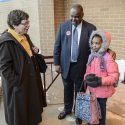Researchers to work with state agencies to improve services for people with disabilities
Two researchers from UW–Madison’s School of Education are collaborating with partners from across Wisconsin and the nation on two new initiatives designed to provide technical assistance to state vocational rehabilitation (VR) agencies in their efforts to help people with disabilities obtain employment and increase their opportunities to be involved in their communities.
The state-federal VR program serves about 1 million individuals per year and spends more than $2.5 billion annually in helping people with disabilities achieve their independent living and employment goals. Nonetheless, these state agencies vary in their employment outcomes.

Tansey

Chan
The first project — the “Vocational Rehabilitation Technical Assistance Center for Targeted Communities: Educate, Empower, and Employ (Project E3)” — will work with state vocational rehabilitation agencies and their partners across the United States to address these issues. This initiative will work specifically with people from economically disadvantaged communities to better identify and address the persistent, pervasive, multi-layered economic and disability-related barriers to employment for marginalized groups with disabilities.
The $12.5 million, five-year federal grant is being led by a team at Southern University, along with co-principal investigators Timothy Tansey and Fong Chan, both faculty members in the Department of Rehabilitation Psychology and Special Education. Tansey and Chan will receive $2.5 million in grant support to evaluate the effectiveness of the initiative.
Tansey and Chan will also play key roles as co-principal investigators on a project called the “Technical Assistance Center for Vocational Rehabilitation Agency Program Evaluation and Quality Assurance.” This initiative, led by UW-Stout colleagues at the Stout Vocational Rehabilitation Institute (SVRI), will establish this center in Menomonie, Wisconsin.
This initiative will aim to help state VR agencies transform their service delivery models and help the program evaluate the most effective services for matching people with disabilities with good-paying jobs consistent with their abilities and career interests. The program will also partner with experts at Michigan State University and the Council of State Administrators of Vocational Rehabilitation.
The researchers will provide technical assistance to state vocational rehabilitation agencies in their efforts to help people with disabilities obtain employment and increase their opportunities to be involved in their communities.
The UW–Madison researchers were awarded a total of $775,000 over the next five years to track the effectiveness of the program evaluation and quality assurance project, with the overall project funding during that period at $2.5 million.
Both research projects, which got underway Oct. 1, are being funded by the Rehabilitation Services Administration. This agency is housed within the U.S. Department of Education’s Office of Special Education and Rehabilitative Services.
Tansey, an assistant professor with the rehabilitation psychology program, has more than 15 years of experience as a rehabilitation counselor and rehabilitation researcher. Chan, in addition to being a professor and chair of the rehabilitation department, is co-director of UW–Madison’s Rehabilitation Research and Training Center on Evidence-Based Practice in Vocational Rehabilitation.
Several other faculty members with the Department of Rehabilitation Psychology and Special Education will also be involved with the targeted communities grant, including Brian Phillips, Susan Smedema, Bonnie Doren, Kimber Wilkerson, Aydin Bal, Andrea Ruppar and Taucia Gonzalez. Bill Hoyt, a professor with the School of Education’s Department of Counseling Psychology, will be involved with the evaluation and quality assurance grant.
Tansey says these projects will not only increase the capacity of state vocational rehabilitation agencies to assist people with disabilities, but also provide UW–Madison students with an opportunity to conduct national research and technical assistance. These initiatives include funding for project assistantships that will allow Ph.D. students with the Department of Rehabilitation Psychology and Special Education to learn and develop their professional skills, and increase their opportunities to network with other researchers and service providers.
“The capacity to provide students with these research opportunities is invaluable in helping us attract high-quality doctoral applicants,” says Tansey. “Such efforts also are integral in assisting the Department of Rehabilitation Psychology and Special Education retain its ranking as … the nation’s No. 1 Rehabilitation Psychology program. Collaborative efforts like this will continue to keep the Rehabilitation Psychology program, the department and the School of Education at the forefront of research and practice.”
Subscribe to Wisconsin Ideas
Want more stories of the Wisconsin Idea in action? Sign-up for our monthly e-newsletter highlighting how Badgers are taking their education and research beyond the boundaries of the classroom to improve lives.
Tags: disabilities, education, outreach, The Wisconsin Idea

